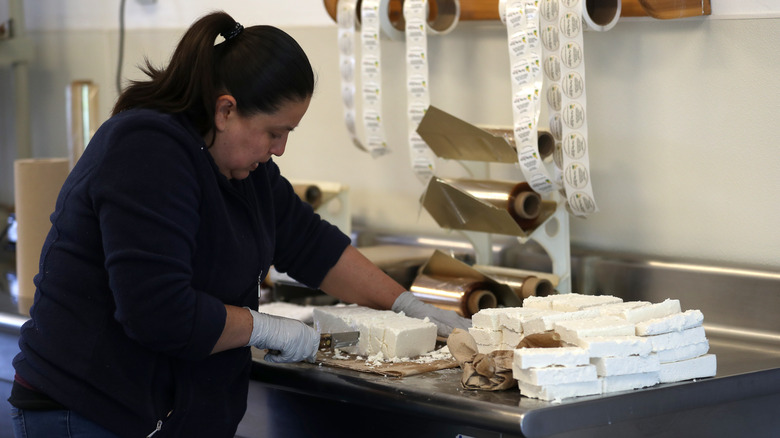What This New Court Decision Means For Danish Feta
A long-simmering battle over the rights to the name "feta" is finally over. This week, a European court ruled Danish companies can no longer market any version of the cheese rooted in Greek history as feta (via Bloomberg). The ruling stems from a 2019 lawsuit alleging Denmark continued to violate the terms of a 2005 European Union (EU) ruling that upheld a Greek petition to grant feta protected designation within the EU, according to NBC. The European Commission granted Greek feta protected status in 2002.
Denmark has consistently argued that feta should apply to the technique for making the cheese, not its place of origin. As NBC reports, at the time of the 2005 ruling, Danish producers were outraged, with one member of the Danish Dairy Board demanding, "What will be next? Will the Italians demand that pizza become a protected product that no one can make?" The European Commission, however, ruled the milk from ewes and goats that graze on Greek terrain gives the cheese a distinct scent and taste — and that's what makes feta unique to Greece.
While some Danish producers pivoted and began rebranding the cheese, others sought to bypass the ruling by selling Danish feta to non-EU nations (via The Guardian). That led to the 2019 complaint and, ultimately, to the recent court ruling confirming Danish producers who continued to use the term feta were undermining Greek producers and, by turning a blind eye, Denmark had failed its obligation to uphold EU law.
What happens now?
At this juncture, it's unclear how Danish producers will adjust to the ruling. Following the 2005 decree, some companies adapted. At that time, a spokesperson for Danish cheesemaker Arla told NBC, "Our feta production will continue. However, we will sell under other names." The company subsequently went on to successfully market its feta-like cheese under the name apetina.
In the meantime, reaction in Greece is decidedly jubilant. "This is a wonderful day for authentic feta cheese," said a representative of the Association of Greek Dairy Industries (via The Guardian). "We are very pleased and delighted. Our complaints have finally been heard."
The ruling is not without precedent. As Bloomberg notes, in 2019, an EU court sided with Spanish producers of Manchego cheese in a bid to stop producers outside Spain's La Mancha region from using the name Manchego. EU judges also shot down an attempt by German producers to market a Parmigiano Reggiano-like cheese as generic parmesan.

